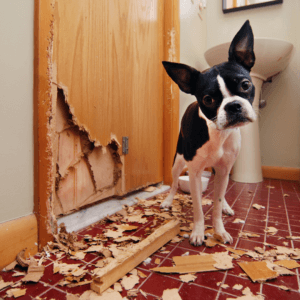 We aren’t the only ones that need to adjust to the ever-changing rollercoaster that has been the last 18 months. Our pets are feeling the stress too, now more than ever, as Victoria and its people exit its second longest lockdown. Likely those of us that were at home all the time, may no longer be, with the kids back at school and adults back in the office or on site to work. Some of us are coping better than others with all this uncertainty, and that includes our pets, especially now that life seems like it may return to something similar to what we had post covid.
We aren’t the only ones that need to adjust to the ever-changing rollercoaster that has been the last 18 months. Our pets are feeling the stress too, now more than ever, as Victoria and its people exit its second longest lockdown. Likely those of us that were at home all the time, may no longer be, with the kids back at school and adults back in the office or on site to work. Some of us are coping better than others with all this uncertainty, and that includes our pets, especially now that life seems like it may return to something similar to what we had post covid.
Whilst we can comprehend the changes that will happen and try and manage our emotions around this, our four legged housemates won’t understand quite what is going on, and many won’t be able to control the stress associated with being apart from us.
The puppies and kittens of 2020/2021 in particular won’t know what ‘normal life’ is!
For some pets, irrespective of what tools are implanted at home – the return to work of their humans will be very stressful and anxiety inducing. Signs of separation anxiety can include;
Unsettled behaviour
Pacing
Whining
Barking
Escaping
Toileting inside
Environmental destruction
Self harm
Animals with separation anxiety should be examined by your veterinarian to assess for underlying medical or anxiety-related concerns that can exacerbate anxiety. Whether these symptoms are mild or severe, attaining a diagnosis from a Veterinarian is the first step toward a targeted treatment and behaviour modification plan.
There are a few things we can do to help our pets so that they can be safely (& happily!) left alone when we return to our normal working and/or weekday routines;
- MAINTAIN A REGULAR ROUTINE – feed & exercise/play with your pets at a similar time to what you would do when life returns to normal. Routine changes can be upsetting for those animals that have a strong body clock
- ALONE TIME – encourage your pet to spend time alone each day that they find enjoyable. A great way to start this process initially is with high-value treats for the pet to enjoy – lickable and easy to focus on treats are ideal (think xylitol-free peanut butter, canned pet food and favourite (safe to eat unsupervised) treats hidden in a Kongs, food bowl mazes, muffin tins etc). Gradually vary the distance (from a different room to being outside) and duration of separation. Offering favourite toys on rotation, and kibble/treats hidden in the environment (‘Sniffaris’) can also help your pet enjoy their time alone (for more ideas on boredom busters see our article**)
- DESENSITISING YOUR WORK ROUTINE – randomly jangle your keys during the day, pick up your work bag during the day, and open and close the front door or garage intermittently so your pets don’t only associate these objects or actions with you leaving.
- EXERCISE – we know from the COVID lifestyle that being cooped up in a house/yard is enough to make anyone go crazy! So take your pets out for walks to keep them stimulated, play games at home and teach new tricks that have them exercising their bodies and minds.
- BUILD CONFIDENCE – puzzle toys, training sessions and teaching new tricks with only positive reinforcement and positive rewards are all essential for building your pet’s confidence and resilience.
We’re always here to help! If your pet is struggling to adapt to new routines as COVID restrictions ease, give us a call.

